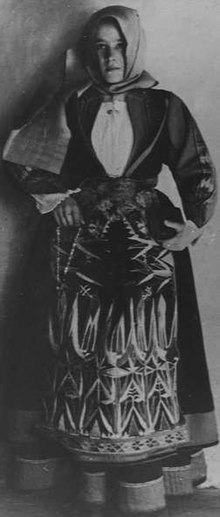Antonia Mesina
Blessed Antonia Mesina (21 June 1919 - 17 May 1935) was an Italian Roman Catholic and part of Catholic Action. Mesina was murdered in mid-1935 after she attempted to fend off a would-be rapist and suffered 74 strikes with a stone before she died.[1][2]
Blessed Antonia Mesina | |
|---|---|
 Antonia Mesina | |
| Laywoman; Martyr | |
| Born | 21 June 1919 Orgosolo, Sardinia, Kingdom of Italy |
| Died | 17 May 1935 (aged 15) Orgosolo, Sardinia, Kingdom of Italy |
| Venerated in | Roman Catholic Church |
| Beatified | 4 October 1987, Saint Peter's Square, Vatican City by Pope John Paul II |
| Feast | 17 May |
| Patronage |
|
Her beatification cause commenced under Pope John Paul I on 22 September 1978 - titled as a Servant of God - while Pope John Paul II confirmed that she had died "in defensum castitatis" and beatified her on 4 October 1987.[3]
Life
Antonia Mesina was born on 21 June 1919 as the second of ten children born to the poor policeman Agostino Mesina and Grazia Rubanu. She was baptized in the local parish church of Saint Peter.[3] She received her Confirmation on 10 November 1920 and received her First Communion in 1926 from the local bishop.
Once she completed her initial education - which spanned a brief period of time - she took over housekeeping at home in order to assist her bedridden mother who suffered from a heart condition. She took care of the household including the care of her siblings as well as cooking and cleaning and washing.[2] Mesina joined Catholic Action movement in 1929 and became a noted recruiter.[1] Mesina liked to be part of this movement and believed that it "helps one to be good".
Mesina set off for Mass one morning with a friend and after that went to gather firewood in mid-1935 when the teenager Ignazio Catigu (1916-1935) attacked her and tried to rape her. Her friend screamed and ran off to find help. Mesina managed to escape twice, but on the third attempt was knocked down. Mesina defended herself and was murdered because she resisted his advances and was struck with a rock 74 times.[1][2] Her remains were examined after her death and it was found that she had not been violated during or after the violent attack. The last blow to her smashed the skull and disfigured her face.[3] Catigu was soon apprehended and on 27 April 1937 sentenced to death; the firing squad executed him on the following 5 August.
On 5 October 1935 the Catholic Action member Venerable Armida Barelli - who had met Mesina once - met with Pope Pius XI and informed him of Mesina's activism and her murder.[3]
Beatification
The beatification process opened on 22 September 1978 under Pope John Paul I and Mesina was henceforth titled as a Servant of God after the Congregation for the Causes of Saints issued the official "nihil obstat" to the cause. The cause commenced in the Diocese of Nuoro on 17 April 1979 after Bishop Giovanni Melis Fois inaugurated the cognitional process and later closed it on 11 March 1985 before the cause received the validation from the C.C.S. on 7 March 1986.
The postulation overseeing the cause compiled and sent the Positio dossier to the C.C.S. in 1986 for assessment which allowed for theologians to review and approve it on 13 January 1987 with the C.C.S. doing the same on 7 March 1987. Pope John Paul II approved the fact that Mesina had died "in defensum castitatis" on 8 May 1987 and therefore of approved her beatification. John Paul II beatified Mesina on 4 October 1987 in Saint Peter's Square.
References
- "Blessed Antonia Mesina". Saints SQPN. 8 April 2015. Retrieved 13 October 2016.
- "Blessed Antonia Mesina". Savior. Retrieved 13 October 2016.
- "Blessed Antonia Mesina". Santi e Beati. Retrieved 13 October 2016.